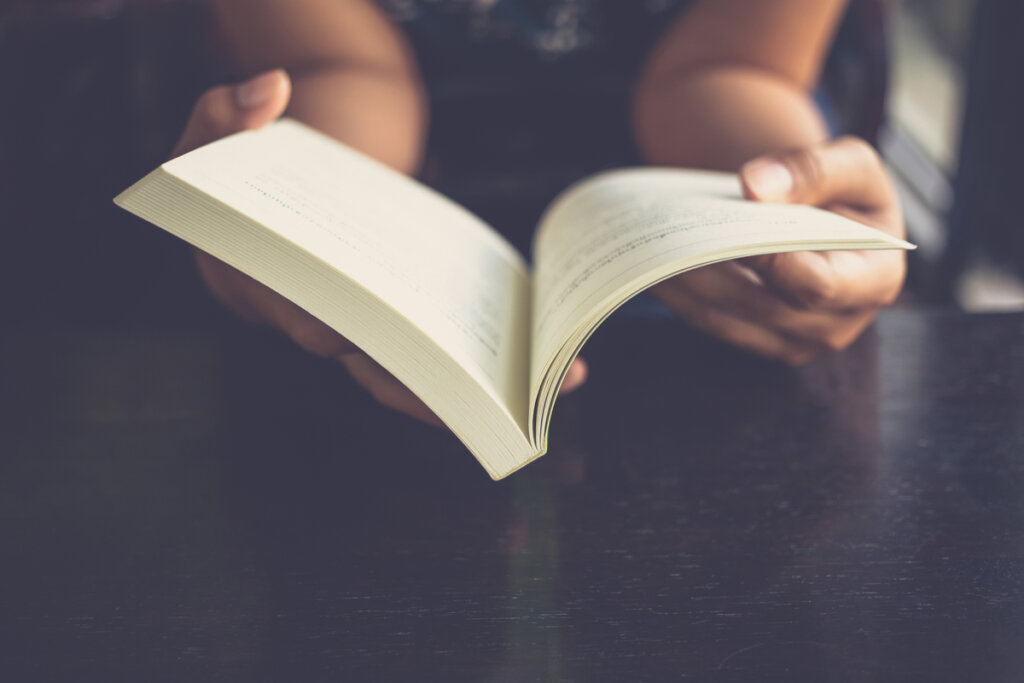What Are The Most Important Literary Genres?

What are the most important literary genres? This is a question that generates a great deal of debate.
Greek authors ranked or divided works according to their usefulness. Today, updating this Hellenic tradition, we’ll identify the most important literary genres following a natural criterion. In fact, this is the kind that most critics take as a reference point today.
“The first book in history was born when words, barely written air, found shelter in the marrow of an aquatic plant.”
-Irene Vallejo-
What are the most important literary genres?
Germán Garrido Miñambres, in his 2010 article for Literature Magazine, claims that reconsideration of the literary genre as a historic entity is required.
Today, the criterion used to divide literature is based on the characteristics of the communicative act. Therefore, this classification is natural (not created by man), it has a universal character, and it’s immovable. From this point of view, we can speak of three or four literary genres.

Lyric or poetry
This is the literary genre that’s based on the expressive communicative attitude. Thus, a poetic text is one that expresses in a personal, subjective way, through emotional functions, such as intersections or exclamations.
The poet is a faker
Who’s so good at his act
He even fakes the pain
Of pain he feels in fact
And those who read his words
Will feel in his writing
Neither of the pains he has
But just the one they’re missing
And so around its track
This thing the heart winds.
A little clockwork train
To entertain our minds
-Fernando Pessoa-
These kinds of texts focus on a specific idea and are characterized by their musicality. However, verses are usually associated with poetry, and this isn’t necessarily always correct.
For example, El Poema del mío Cid (The Poem of the Cid) formally has verses and rhymes. Nevertheless, it’s not a lyrical text, but a narrative one. On the other hand, it should be noted that this genre is one of the oldest. That’s because its composition facilitated oral transmission. This was extremely important as writing wasn’t commonplace and societies felt the need to transmit their historical legacy to the following generations.
Within the lyric, there are different subgenres:
- Song.
- Eclogue.
- Elegy.
- Epigram.
- Anthem.
- Ode.
“Rhythm is not only an ally of memory, but it is also a catalyst for our pleasures – dance, music, and sex play with repetition, rhythm, and cadences. Language also has infinite rhythmic possibilities.”
-Irene Vallejo-
Epic (narrative)
The epic genre has a narrative attitude. In other words, it tells a story. The epic is a narration by one who relates a series of actions carried out by some characters in a specific time and place. It’s a natural genre because storytelling can be found anywhere in the world, with variations in different societies.
Furthermore, the literary narrative is a self-referential or fictional narrative. This means it doesn’t correspond to reality. It implies that the person who tells the story isn’t the author, but the narrator (the voice that the author creates).
For this reason, the story of Don Quixote is told by Cide Hamete Benengeli, the Moorish translator who found the papers about the adventures. He was, of course, another of Miguel de Cervantes’ inventions. Within the narrative or the epic genre, there are several subgenres as well:
- Story.
- Fable.
- Epic.
- Novel.
- Romance.
- Short story.
Dramatic
The theater is based on the representative attitude. Their texts are different because they were expressly created to be represented, in the same way as movies. Thus, when reading a theatrical text, the annotations are important.
One of the best examples of this is in the work Saying Yes by Griselda Gambaro. In this work, there’s hardly any dialogue; since the information between the hairdresser and the man is given precisely in what isn’t said, in the silences. In fact, it’s used as a way of denouncing the period of military dictatorship that Argentina suffered.
On the other hand, when you attend a play, you enter a kind of illusion of reality. In other words, you have the feeling that what happens on stage is a reality separate from the world. This would be what some have called “the fourth wall”. However, since the 20th century, the main objective has been to break it by way of placing actors among the audience.
Nevertheless, the main subgenres continue to prevail. They are:
- Tragedy.
- Comedy.
- Tragicomedy.
- Drama.
- Melodrama.
- Auto sacramental.
- Loa.
- Side dish.
- Sainete.

Essay
Finally, although this is currently a topic that generates controversy among literary critics, the essay could also be considered as another genre apart. It’s marked by its argumentative or expository attitude.
However, the problem of whether the essay may be considered as a literary genre has to do with how literature is actually defined. The definition tends to be that it’s how the message is transmitted that’s important. However, with the essay, what’s said is more important than how it’s said.
The theory of literature
Literature is one of the seven fine arts. It’s perfectly normal that people sometimes decide what is and what isn’t literary. Indeed, this has happened throughout history.
The theory of literature is that charged with laying the foundations and cataloging the different creations. This effort clashes on many occasions, in fortunate and magical ways. Because it means that each work is personal and unrepeatable. In fact, each work belongs to its author and has its own context and special sensitivity.
What are the most important literary genres? This is a question that generates a great deal of debate.
Greek authors ranked or divided works according to their usefulness. Today, updating this Hellenic tradition, we’ll identify the most important literary genres following a natural criterion. In fact, this is the kind that most critics take as a reference point today.
“The first book in history was born when words, barely written air, found shelter in the marrow of an aquatic plant.”
-Irene Vallejo-
What are the most important literary genres?
Germán Garrido Miñambres, in his 2010 article for Literature Magazine, claims that reconsideration of the literary genre as a historic entity is required.
Today, the criterion used to divide literature is based on the characteristics of the communicative act. Therefore, this classification is natural (not created by man), it has a universal character, and it’s immovable. From this point of view, we can speak of three or four literary genres.

Lyric or poetry
This is the literary genre that’s based on the expressive communicative attitude. Thus, a poetic text is one that expresses in a personal, subjective way, through emotional functions, such as intersections or exclamations.
The poet is a faker
Who’s so good at his act
He even fakes the pain
Of pain he feels in fact
And those who read his words
Will feel in his writing
Neither of the pains he has
But just the one they’re missing
And so around its track
This thing the heart winds.
A little clockwork train
To entertain our minds
-Fernando Pessoa-
These kinds of texts focus on a specific idea and are characterized by their musicality. However, verses are usually associated with poetry, and this isn’t necessarily always correct.
For example, El Poema del mío Cid (The Poem of the Cid) formally has verses and rhymes. Nevertheless, it’s not a lyrical text, but a narrative one. On the other hand, it should be noted that this genre is one of the oldest. That’s because its composition facilitated oral transmission. This was extremely important as writing wasn’t commonplace and societies felt the need to transmit their historical legacy to the following generations.
Within the lyric, there are different subgenres:
- Song.
- Eclogue.
- Elegy.
- Epigram.
- Anthem.
- Ode.
“Rhythm is not only an ally of memory, but it is also a catalyst for our pleasures – dance, music, and sex play with repetition, rhythm, and cadences. Language also has infinite rhythmic possibilities.”
-Irene Vallejo-
Epic (narrative)
The epic genre has a narrative attitude. In other words, it tells a story. The epic is a narration by one who relates a series of actions carried out by some characters in a specific time and place. It’s a natural genre because storytelling can be found anywhere in the world, with variations in different societies.
Furthermore, the literary narrative is a self-referential or fictional narrative. This means it doesn’t correspond to reality. It implies that the person who tells the story isn’t the author, but the narrator (the voice that the author creates).
For this reason, the story of Don Quixote is told by Cide Hamete Benengeli, the Moorish translator who found the papers about the adventures. He was, of course, another of Miguel de Cervantes’ inventions. Within the narrative or the epic genre, there are several subgenres as well:
- Story.
- Fable.
- Epic.
- Novel.
- Romance.
- Short story.
Dramatic
The theater is based on the representative attitude. Their texts are different because they were expressly created to be represented, in the same way as movies. Thus, when reading a theatrical text, the annotations are important.
One of the best examples of this is in the work Saying Yes by Griselda Gambaro. In this work, there’s hardly any dialogue; since the information between the hairdresser and the man is given precisely in what isn’t said, in the silences. In fact, it’s used as a way of denouncing the period of military dictatorship that Argentina suffered.
On the other hand, when you attend a play, you enter a kind of illusion of reality. In other words, you have the feeling that what happens on stage is a reality separate from the world. This would be what some have called “the fourth wall”. However, since the 20th century, the main objective has been to break it by way of placing actors among the audience.
Nevertheless, the main subgenres continue to prevail. They are:
- Tragedy.
- Comedy.
- Tragicomedy.
- Drama.
- Melodrama.
- Auto sacramental.
- Loa.
- Side dish.
- Sainete.

Essay
Finally, although this is currently a topic that generates controversy among literary critics, the essay could also be considered as another genre apart. It’s marked by its argumentative or expository attitude.
However, the problem of whether the essay may be considered as a literary genre has to do with how literature is actually defined. The definition tends to be that it’s how the message is transmitted that’s important. However, with the essay, what’s said is more important than how it’s said.
The theory of literature
Literature is one of the seven fine arts. It’s perfectly normal that people sometimes decide what is and what isn’t literary. Indeed, this has happened throughout history.
The theory of literature is that charged with laying the foundations and cataloging the different creations. This effort clashes on many occasions, in fortunate and magical ways. Because it means that each work is personal and unrepeatable. In fact, each work belongs to its author and has its own context and special sensitivity.
All cited sources were thoroughly reviewed by our team to ensure their quality, reliability, currency, and validity. The bibliography of this article was considered reliable and of academic or scientific accuracy.
- Fernández Molina A. Los poemas escogidos de Fernando Pessoa (Book Review) [Internet]. Vol. 86, Arbor. 1973. p. 139. Disponible en: https://www.proquest.com/docview/1301367737?pq-origsite=gscholar&fromopenview=true&imgSeq=1
- Gambaro G. Decir sí (Un acto). Hispamérica. 1978;7(21):75-82.
- Miñambres GG. Géneros literarios y literatura comparada. Rev Lit. 2010;72(143):11-32.
This text is provided for informational purposes only and does not replace consultation with a professional. If in doubt, consult your specialist.







